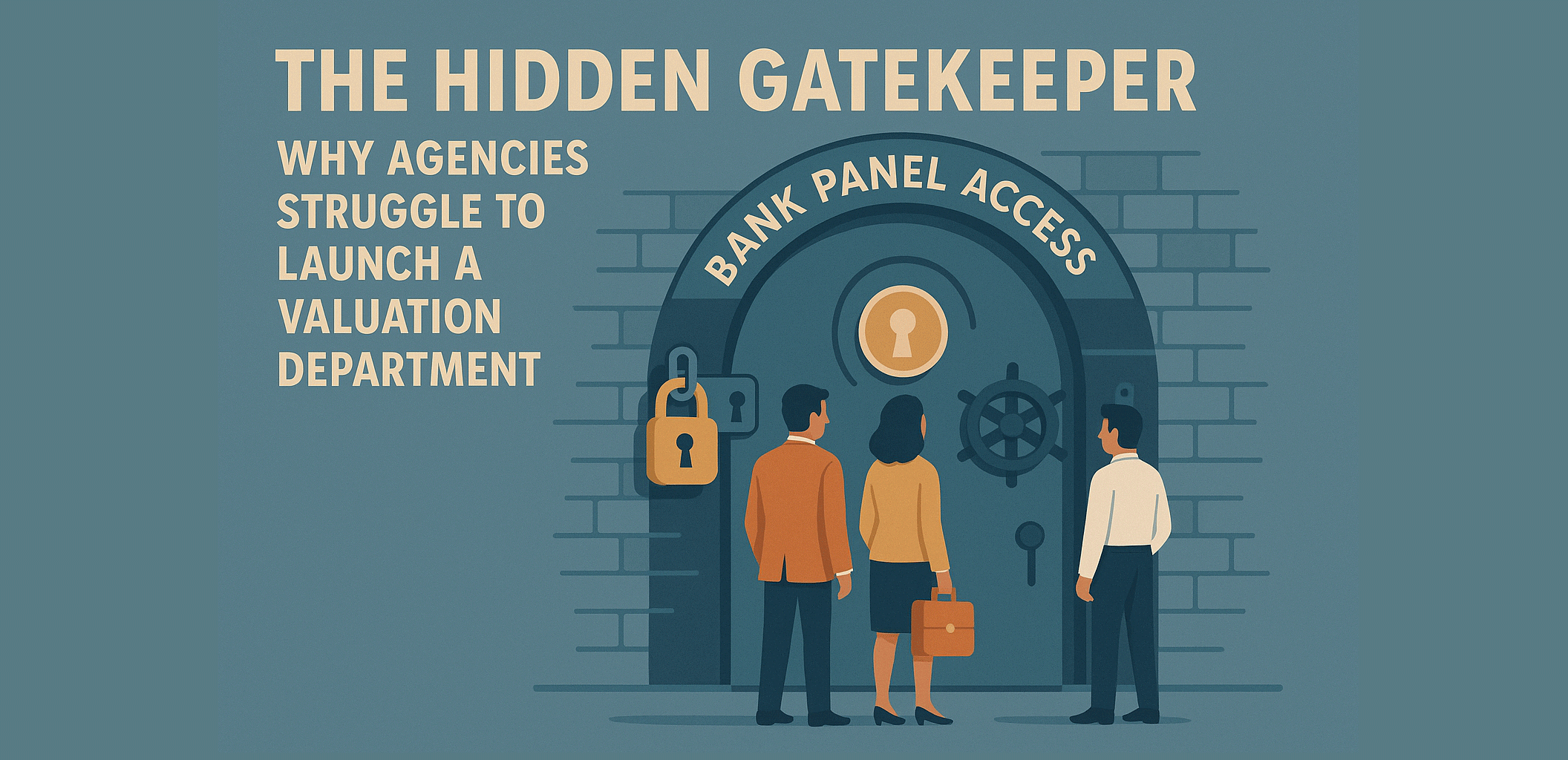The Hidden Gatekeeper: Why Agencies Struggle to Launch a Valuation Department

On paper, adding a valuation department looks like a smart, natural step for any growing real estate agency. It promises greater credibility, market diversification, and, most appealingly, a consistent stream of professional, recurring income.
Yet, in Malaysia’s tightly regulated property market, establishing a valuation arm is one of the hardest moves an agency can make.
The primary obstacle isn’t a lack of qualified staff or licensing approvals. It’s a fundamental issue of access. In valuation, access means one thing: bank panel inclusion. Without it, there is virtually no path to consistent, profitable work.
This article unpacks why this gatekeeping system makes valuation expansion so challenging—and what it truly takes to break through.
The Bank Panel Bottleneck: The Gate to Survival
In Malaysia, the valuation industry is overwhelmingly bank-dependent.
Well over half of all valuation assignments originate from mortgage-related work—reports required by buyers, owners, and investors for financing, refinancing, or bridging loans.
This dependency is what makes valuation such a stable, guaranteed-income business:
When the market is good, banks issue more housing loans, creating a surge in financing valuations.
When the market is bad, foreclosures increase, generating more forced-sale and auction valuations.
Valuers on bank panels stay busy regardless of market cycles; the job flow simply shifts direction. That’s why inclusion on multiple bank panels is the single most valuable asset a valuation firm can hold. It ensures business continuity through every phase of the market—a stability that sales-only agencies can never match.
But getting on those panels is the steepest barrier to entry in the entire profession.
Each Bank Sets Its Own Gate
Variable Criteria: Every bank has its own checklist. Some prioritize years of experience; others demand high paid-up capital, specific professional indemnity coverage, or a minimum staff count.
Fixed Quotas: Most major banks cap the number of valuers per region. Until a firm exits or is removed, no new applicant can be admitted.
Slow, Manual Approvals: Applications can sit for months in review, with no assurance of success—no matter how qualified the firm is.
Without inclusion, a valuation department is practically idle—no panel, no work.
Few Viable Alternatives Outside Bank Work
Some firms attempt to bypass bank assignments, but the alternative markets are limited and dominated by incumbents. The stability of mortgage valuations is irreplaceable. Alternative markets rarely provide comparable volume or predictability:
Corporate Valuations: REITs, IPOs, and Securities Commission submissions are concentrated among large, long-established firms with deep compliance history and brand credibility. Newcomers lack the necessary track record to compete for this high-stakes work.
Government Valuations: Land acquisition, rating appeals, and taxation assignments are quota-based, relationship-driven, and often reserved for long-standing panel firms.
For newcomers, these niches can supplement income but can never replace the high-volume, recurring business generated by bank work.
The Reality Check: Access First, Ambition Later
Before launching a valuation department, agency owners must confront four truths:
Licensing = Cash Flow: BOVAEP registration grants legality, not job volume.
Bank Panels Are the Lifeline: Without inclusion, operations will stall.
Alternatives Are Sparse: Corporate and government work heavily favour incumbents.
The First Job Is Granted, Not Earned: In valuation, work is given by banks, not chased by sales efforts.
Starting a valuation department isn't about ambition; it's about access. Without bank panels, even the most skilled valuers face empty pipelines.
Smart Entry Strategies: Acquire or Merge
For agencies determined to build a valuation arm, the smartest path is not from scratch—it’s through strategic acquisition or partnership. This is about buying or merging to acquire panel access directly.
Option 1: Acquire a Retiring Valuation Firm
The most direct route is to buy an existing firm with established panel access. Many principals nearing retirement lack successors who are registered valuers. With a sound transition plan and a retained signatory, the acquiring agency inherits both the credentials and the panel relationships instantly.
Option 2: Merge for Mutual Benefit
Alternatively, merge with an existing valuation firm that has panel inclusion but limited sales infrastructure.
This synergy allows:
The valuation arm to enjoy new client pipelines from the agency.
The agency to benefit from the valuation firm’s stable, counter-cyclical income.
This creates a powerful, complementary business model—recurring income meets transactional velocity.
Final Verdict: Until the Gate Opens, It’s Just a Cost Centre
Launching a valuation department is not a branding exercise—it’s a battle for access.
Without bank panels, there is no deal flow, no matter how strong your team or license. The first job isn’t earned—it’s granted by the gatekeepers. To succeed, agencies must think beyond hiring valuers. They must plan acquisitions, mergers, or long-term networking to secure panel access.
Until that gate opens, your valuation department is not a business—it’s an expense.











































































































